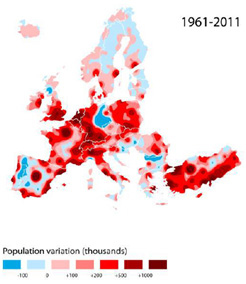The core long-term structural demographic change in Europe is ageing: the current ratio of working age population to old dependent population below 4 to 1 will according to Eurostat projections be replaced by a ratio of 2 to 1 by 2050. Demographic change in individual Local and Regional Authorities (LRAs) will depend on their capacity to attract the workingage population. However, concentrations of seniors in specific localities and regions do not necessarily constitute a challenge or handicap, insofar as this population’s income from retirement schemes provides the basis for the development of a wide range of economic activities. The objective of the present study is to feed into debates on how LRAs may best address demographic changes and prepare for foreseeable future evolutions on different levels:
- Chapter 1 provides an overview of observed patterns, trends and current projections, as well as a brief overview of current EU initi¬atives that address demographic change;
- Chapter 2 considers how demographic change may generate challenges for LRAs, especially in terms of service provision, and presents solutions on how these challenges may be addressed;
- Chapter 3 describes local and regional development opportunities and challenges that may be linked to demographic change, and explores different ways in which demographic change can be approached as a development lever;
- Chapter 4 presents recommendations based on the findings of the report.

The recommendations of the study emphasize the importance of wider approaches to address demographic changes at the level of LRAs. Considering new needs and possibilities resulting from ageing is only one component. To compensate for a relatively less important working-age population, one can consider the diversity of reasons for which some parts of local and regional human capital is under-utilised. European-level initiatives can play an important role promoting thinking “out of the box” in this regard. This includes efforts to encourage closer cooperation with private and social economic actors.





